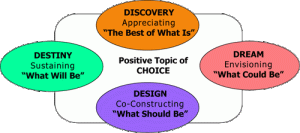 I like to learn new things. I’m curious about how different people work, and I’m curious about what works for different people. Before I started on my coaching journey with Myles Downey and the School of Coaching, I’d been to one of those cheap one day introductions to NLP. I decided there and then not to pursue it, mostly because I was concerned about the lack of ethical framework; the way that selling stuff seemed to segue into therapy without there being any boundaries; the lack of a sense of responsibility for a client’s well-being. I was lucky enough to get a place on the School of Coaching course, which led to a genuine academic qualification and placed values and respect for the authority of the individual at the heart of everything we did. As I developed in my learning, I realised that there was a link between person centred coaching and the counselling training I’d done way back in the 1980s. The goals and focus of coaching and counselling may be different, but the values around how we work respectfully with people are the same, and both need to sit within an ethical framework, one in which the practitioner is accountable to the client, preferably through a professional body.
I like to learn new things. I’m curious about how different people work, and I’m curious about what works for different people. Before I started on my coaching journey with Myles Downey and the School of Coaching, I’d been to one of those cheap one day introductions to NLP. I decided there and then not to pursue it, mostly because I was concerned about the lack of ethical framework; the way that selling stuff seemed to segue into therapy without there being any boundaries; the lack of a sense of responsibility for a client’s well-being. I was lucky enough to get a place on the School of Coaching course, which led to a genuine academic qualification and placed values and respect for the authority of the individual at the heart of everything we did. As I developed in my learning, I realised that there was a link between person centred coaching and the counselling training I’d done way back in the 1980s. The goals and focus of coaching and counselling may be different, but the values around how we work respectfully with people are the same, and both need to sit within an ethical framework, one in which the practitioner is accountable to the client, preferably through a professional body.
So how did I find myself contemplating NLP again? First of all, there was the offer of a free two day course that came through a trusted network. And I have friends who work with NLP, friends I respect. And I’d been very pleasantly surprised by a CPD seminar presented by Sue Knight through the EMCC. And, when I rang the person delivering the training, it was clear that ethics were important to her too, and her background was in psychology, rather than sales. I did the first two days, and enjoyed them. I’m a magpie for things that may be useful, at some point, in my work. Some of that introductory thinking made sense, and I was intrigued by the eye movement stuff. I had a week in which to sign up for the next two days – which would get me a diploma! – after which the price would rise dramatically (beginning to see a pattern?) and, somewhat uncharacteristically for me, I signed – and paid – up. But by the end of the “diploma” weekend (no-one fails, by the way), I had made a very firm decision to end my dalliance with NLP.
So what happened? Well, first of all the trainers started to disclose some of the more subtle tricks of the trade. They didn’t talk about “if you decide to go further and take the practitioner course”, they talked about “when”. There were ways of using language that manipulated the “client”. I began to have the very uneasy feeling that I’d been duped into doing this course because they’d used suggestive language during the freebie. My sense of uneasiness grew throughout the weekend, a gut feeling of dis-ease. So much of the focus was on the practitioner influencing, leading, planting suggestions, and I could see how easy it would be to manipulate someone without their having a clue about what was happening. Sales and personal development should not, in my mind, share the same bed. There was no talk about empathy, none of the beautiful active listening that is central to person centred approaches, none of the creativity that we can bring to a coaching session through following the client’s interest. There are some useful things, to be sure, and I wouldn’t trash everything by any means; but the most valuable thing I learnt was that sometimes you have to take a wrong path to get back on the right one, and I have been incredibly blessed by having the teachers – in counselling, coaching, yoga, and life – that I have had along the way. I want to continue to develop and work in a way that honours the other’s own resourcefulness and integrity.










